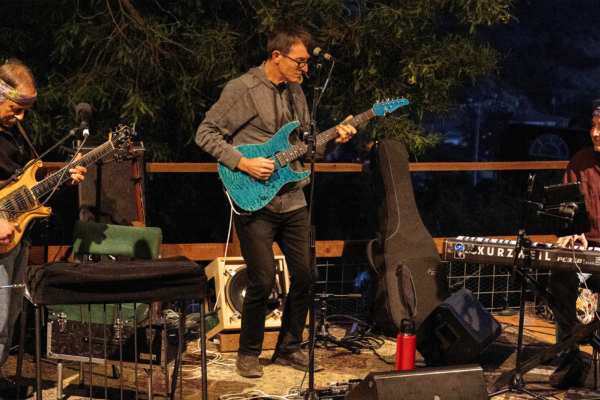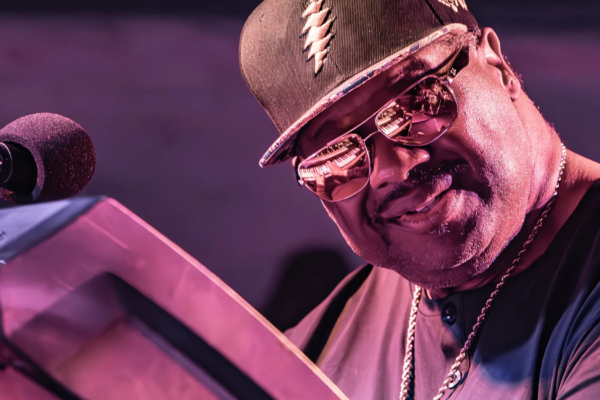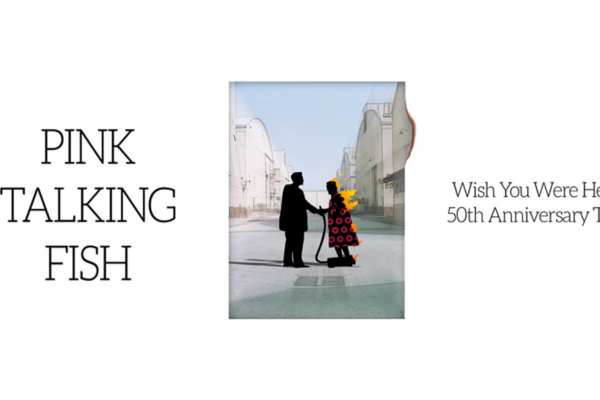February 28, 2025 • The Hamilton Live • Doors 6:30 pm
Sierra Hull
Stephanie Lambring
Venue Information

202-787-1000
600 14th Street NW
Washington, DC 20005
Sierra Hull
In her first 25 years alone, singer/songwriter/multi-instrumentalist Sierra Hull hit more milestones than many musicians accomplish in a lifetime. After making her Grand Ole Opry debut at the age of 10, the Tennessee-bred virtuoso mandolinist played Carnegie Hall at age 12, then landed a deal with Rounder Records just a year later. Now 28-years-old, Hull is set to deliver her fourth full- length for Rounder: an elegantly inventive and endlessly captivating album called 25 Trips.
Revealing her profound warmth as a storyteller, 25 Trips finds Hull shedding light on the beauty and chaos and sometimes sorrow of growing up and getting older. To that end, the album’s title nods to a particularly momentous year of her life, including her marriage to fellow bluegrass musician Justin Moses and the release of her widely acclaimed album Weighted Mind—a Béla Fleck- produced effort nominated for Best Folk Album at the 2017 Grammy Awards.
“There’s a lot of push-and-pull on this record, where in some moments I feel like everything’s happening so fast and I wish I could slow it all down so I can really enjoy it,” Hull points out. “But then there are also times where I’m looking forward to the day when the craziness has died down a bit, and life’s a little calmer.”
Made with producer/engineer Shani Gandhi (Kelsea Ballerini, Dierks Bentley, Sarah Jarosz, Alison Krauss), 25 Trips continues the musical journey begun on Weighted Mind, a body of work that built off Hull’s bluegrass roots and ventured into entirely new terrain. But while its predecessor assumed a sparse and stripped-back palette, 25 Trips embodies a far more intricately arranged sound—an effect achieved with the help of peers like guitarist Mike Seal, bassist Ethan Jodziewicz, violinist Alex Hargreaves, and fiddler Christian Sedelmyer, as well as several musicians that Hull has long admired (including bassist Viktor Krauss, guitarist Bryan Sutton, and multi-instrumentalist Stuart Duncan). Along with integrating electric instrumentation and percussion into her material for the first time, Hull dreamed up the album’s eclectic textures by embracing a free-flowing process that often gave way to lightning-in-a-bottle improvisation.
“There were some songs that we created from the ground up, where I’d go in and play by myself, and from there we’d bring in other musicians to add more and more layers,” Hull says. “It was really wonderful to work that way, where we started from a place of mystery and then just let the song show us what it wanted or needed to become.”
Immediately proving the power of that approach, 25 Trips lures the listener into its unpredictable sonic world on the beguiling opening track “Beautifully Out of Place.” With its shifting tempos and gently tempestuous mood, the song was sparked from words of encouragement spoken by Hull’s husband at a time of self-doubt and confusion. “I remember Justin saying to me, ‘I believe in you, so you’re just going to have to learn to believe in yourself,’” she recalls. “That inspired the first line for me, and the song just wrote itself from there.”
Although much of the album bears a rich complexity, 25 Trips also includes moments of stark simplicity that perfectly showcase Hull’s stunning vocal range. On “Everybody’s Talking,” for instance, her luminous vocals quietly capture the frustration of finding clarity in the midst of constant chatter from the outside world. And on “Ceiling to the Floor”—co-written with Kai Welch, a songwriter/musician known for his work with Glen Campbell and Abigail Washburn—Hull spins a tender metaphor from her longtime fear of heights. “I was telling Kai about how when I was little my dad used to try to get me over that fear by holding me up to the ceiling and saying, ‘Just touch it—I’m not gonna let you fall,’” she explains. Featuring a performance from legendary steel-guitar player Paul Franklin, “Ceiling to the Floor” drifts from memory to real-time reflection, slowly unfolding as a nuanced meditation on courage and love.
One of the most unexpected turns on 25 Trips, “Escape” emerges as a delicate collage of hypnotic percussion, otherworldly electric-mandolin tones, and poetic yet plainspoken lyrics (e.g., “I want to escape to a world that’s not closing in”). “I didn’t even have that song on my list for the album, but I played Shani a voice memo and right away she said, ‘I wanna record that,’” remembers Hull, who penned “Escape” with singer/songwriter Angel Snow. “I was a little hesitant since it’s so unlike anything else I’ve done, but in the end it was really exciting to play electric and come up with something in a completely different vein.”
In closing out 25 Trips, Hull shares an especially poignant track titled “Father Time.” “I wrote that song with Mindy Smith after spending a week with my husband and his grandma, after his grandpa had a stroke on Christmas morning,” she says. “His grandma had suffered with Alzheimer’s for years and couldn’t really stay by herself, and through that experience I decided to write about watching my husband take such good care of her, and how that made me love him even more.” With its heavy-hearted melody and choir-like harmonies, “Father Time” shows Hull’s effortless finesse in embedding her music with so many subtle details (including an instrumental reference to “Jingle Bells” tucked into the second verse). “We had our instruments with us at Christmas, so at some point we played ‘Jingle Bells’ for my husband’s grandma,” says Hull. “She can’t remember my name or Justin’s name now, but for some reason ‘Jingle Bells’ stuck, and she still asks for it year- round—it’s the most amazing thing.”
Even as its songs continually shift in genre, encompassing everything from bluegrass to folk-pop to ethereal alt-rock, 25 Trips remains rooted in the sophisticated musicianship that Hull has cultivated almost her entire life. Hailing from the tiny Tennessee hamlet of Byrdstown, she learned to sing from her mother as toddler, took up mandolin just a few years later, and began joining in local bluegrass jams by the young age of eight. With her childhood triumphs including joining her hero and mentor Alison Krauss onstage at the Grand Ole Opry at age 11, she made her Rounder debut with the 2008 album Secrets and promptly garnered the first of many nominations for Mandolin Player of the Year at the International Bluegrass Music Association Awards. In 2016, after a near- decade of consecutive nominations, Hull became the first-ever woman to win the award—then claimed that prize again at the 2017 and 2018 IBMAs. Over the years, Hull has also maintained a rigorous touring schedule, and has made occasional guest appearances with such icons as the Indigo Girls, Garth Brooks, and Gillian Welch.
Marking a bold new era in Hull’s artistic evolution, 25 Trips wholly channels the pure and palpable joy she discovered in the album’s creation—and ultimately illuminates certain truths about the indelible connection between risk-taking and reward. “One of the things I most enjoyed about making this record was getting to show the wide variety of music I love,” says Hull. “I don’t really know what category the album falls in, but I also think that matters less and less. What really matters to me is trusting myself to be who I am, and just putting my voice and my heart out there in the most sincere way that I possibly can.”
Stephanie Lambring
“I’m not afraid of the uncomfortable,” says Stephanie Lambring. “Oddly enough, I think you can actually find a lot of comfort in exploring it, in facing it head on and seeing it for what it really is.”
It’s that paradox that lies at the heart of Lambring’s stunning new record, Hypocrite. Recorded in Nashville with producer Teddy Morgan (Carl Broemel, Elise Davis), the collection is a remarkable work of self-reflection from an artist determined to know her truest self (and to help us find our own true selves in the process). The arrangements are lush and hypnotic here, with Lambring’s breathy vocals floating atop a sea of dreamy synthesizers and shimmering guitars, and the writing is as raw and vulnerable as it gets, confronting everything from religion and trauma to body image and motherhood with unflinching honesty. The result is a record that lands somewhere between Phoebe Bridgers and Alanis Morrissette as it looks for the best by reckoning with the worst, an album full of love and grace and compassion that aims to remind us that imperfection and humanity go hand in hand.
“They say the things you dislike about yourself are the things you call out the most in other people,” Lambring explains, “and with this album, I wanted to see what would happen if I called myself out instead. I think there’d be a lot more harmony in the world if we could just own up to our own shortcomings and forgive ourselves in the process.”
Such deep and thoughtful reflection has been a hallmark of Lambring’s work from the very beginning. Born and raised in Indiana, she got her start in Nashville working as a songwriter on Music Row, but after five years of composing for other artists, she asked to be let go from her publishing deal and walked away from the music business entirely. Feeling adrift creatively, she picked up work waiting tables at a restaurant and quit writing for an entire year until a regular customer—legendary songwriter Tom Douglas—encouraged her to return to her craft, this time for herself.
“It felt like my creativity had been rehabbed during that time away from the music industry,” Lambring recalls. “Writing for myself allowed me to say what I wanted to say, to sing about what felt important to me, and that changed everything.”
Lambring’s 2020 debut, Autonomy, was a critical smash, prompting Rolling Stone to hail her “John Prine-esque observation” and NPR to declare her “one of Nashville’s most fearless young singer-songwriters.” In addition to all the rave reviews, the album also landed Lambring on the cover of Tidal’s Rising Folk playlist, helped earn performances everywhere from Mountain Stage to the famed Bluebird Cafe, and led to an extensive US tour with Amigo The Devil. All the while, songs for Lambring’s much-anticipated follow-up were already brewing.
“I knew I wanted to write some of these songs for years before I was actually able to put them into words,” she explains. “They were just these little seeds planted in my subconscious that I’d keep coming back to until I felt like I’d finally experienced enough life to sit down and express them.”
The recording process was a similarly slow and deliberate one, with Lambring and Morgan working together on the songs on-and-off over the course of an entire year, experimenting with unexpected instrumentation and blurring the boundaries between roots music and indie rock.
“The foundation of this record is really just the two of us seeing how far we could push the songs,” Lambring says. “We’d get together and lay down the bones of a track, and then we’d come back to it a few weeks later and see how else we might be able to approach the same idea in order to take it someplace new and exciting. We would keep bouncing from one song to another, just tweaking and overdubbing and reinventing things right up until the very end.”
That adventurous spirit is clear from the top on Hypocrite, which opens with the brooding “Cover Girl.” Fueled by a thick, sinuous synth-bass and perpetually unsettled drumbeat, the track grapples with the modern pressures of a social media-driven world in which dysmorphia runs rampant and projection outweighs authenticity. “She writes, ‘Beauty’s on the inside’ / Underneath a picture of her good side,” Lambring sings with a deadpan delivery. “She watches on standby / As we tell her she’s pretty.” But rather than treat the observation as a scathing indictment, Lambring instead turns the lens on herself and her own implication in perpetuating the status quo despite her best efforts to break free of it. “Cover girl for inner beauty / Shine it up and sell it to me / We don’t have to believe it, do we? / Do we? / Do we?” It’s a question that sounds less convincing every time she asks it, the uncertainty building with each repetition. The tender “Filler” wonders who we’re really trying to please when we change our appearance (and if it will ever be enough), while the driving “Purity Ring” interrogates sex and shame and abstinence and abortion in the face of a strict religious upbringing full of double standards, and the aching “Good Mother” questions the traditional narratives of parenthood, giving voice to the fears and regrets that society deems too taboo to say out loud. “They say it’s the hardest / Best thing they’ve ever done,” Lambring sings wistfully. “But if it’s just the hardest / You can’t tell anyone.”
“I never felt a pull towards motherhood,” she explains. “I felt a lot of pressure about it, though, so I leaned into my anxiety and started researching. I dove deep on Reddit threads. I listened to podcasts. I read Regretting Motherhood: A Study by Orna Donath. There were so many heartbreaking accounts from mothers who loved their children but would be childfree if they had it to do over again, and I had a gut feeling that I would be one of those mothers. I wrote this song to process and sit with my own fears about it all, and to offer a voice for mothers who feel that way, either as a constant ache or in moments or seasons of exhaustion.”
Lambring finds unique ways to blend the deeply personal with the universal throughout the record, often transforming intimate slices of life into thought-provoking reflections on the human condition at large. The devastating “Hospital Parking” spins a garage fee into a meditation on grief and love and hope and loss; the unrelenting “Mirror” shines a light on the ugliness we try to hide, wrestling with the ways our desire to label things as “good” or “bad” without any room for nuance can spill out into politics and culture wars; and the country-tinged “Two-Faced” takes a self-deprecating look at insincerity, with Lambring singing, “We’re all a little two-faced / ‘Hey, how are you?’ fake / Makes the world go ‘round / God forbid some honesty would ruffle up this town.”
“I’ve lived in the south for 18 years, and when you pair that with a tendency to people-please, I haven’t always been the most direct (or enjoyed people being direct with me),” Lambring confesses. “Over the past several years, I’ve appreciated and practiced directness more and more, but it’ll probably always be something of a struggle for me, so it was therapeutic to poke some fun at myself and my fragile ego.”
In the end, such therapy is what Hypocrite is all about. The songs are serious, even painful at times, but they’re laced with humor and ultimately built to heal. Stephanie Lambring isn’t afraid to face the uncomfortable, and in the process, she offers up more than a little comfort for the rest of us.
Related Shows
Feb 20 (Thu) • The Hamilton Live • Doors 6:30 pm
Skeleton Krewe Trio
feat Rob Barraco, Stephen Inglis and Barry Sless
Feb 22 (Sat) • The Hamilton Live • Doors 6:30 pm
Psycho Killers (Talking Heads Tribute)
Walking In The Air
Mar 13 (Thu) • The Hamilton Live • Doors 6:30 pm
Daniel Donato's Cosmic Country
On the Road to All Good Now
Mar 14 (Fri) • The Hamilton Live • Doors 6:30 pm
Daniel Donato's Cosmic Country
On the Road to All Good Now






